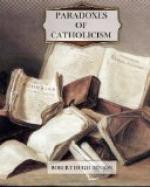We Catholics are wrong, therefore, for both reasons and in both directions. We are wrong when we put self first and we are wrong when we do not. We are wrong when we launch out into the current of life, and wrong when we withdraw ourselves from its waters. We are wrong when we insist upon our personal responsibility, and wrong when we look to the Church to undertake it.
II. (i) Here then, indeed, is a Paradox; but it is one which our Lord Himself expressly emphasizes. For, first, there is nothing on which He so repeatedly insists as the supreme and singular value of every soul’s salvation. If this is not attained, all is lost. What shall it profit a man if he shall gain the whole world and suffer the loss of his own soul? All else, then, must be sacrificed if this is in peril. No human possession, however great, can be weighed against this. No human tie, however sacred, can hold against its claim. Not only must houses and lands, but father and mother and wives and children must take second place, so soon as eternal life is at stake. And yet, somehow or another, this salvation can only be attained by loss; self can only live if it be mortified, can only be saved by its own denial. Individuality, as has been said, can only be preserved by the loss of Individualism.
(ii) But this is not peculiar to the spiritual sphere; it is a paradox that is true, in some sense, of life on every plane—civic, intellectual, artistic, human. The man that desires to bring his intellectual and personal powers to their highest pitch must continually be sinking them, so to speak, in the current of his fellows, continually exhausting, using, and wearing them out. He must risk, and indeed inevitably lose, in a very real sense, his personal point of view, if he is to have a point of view that is worth possessing; he must be content to see his theories and his thoughts modified, merged, changed, and destroyed, if his thought is to be of value. For, so far as he withdraws himself from his fellows into a physical or mental isolation, so far he approaches egotistic madness. He cannot grow unless he decreases; he cannot remain himself unless he ceases to be himself.
So, too, is it in civic and artistic life. The citizen who truly lives to the State of which he is a member—the man to whom his country raises a monument, for example—is one, always, who has lost himself for his nation, whether he has died in battle or sacrificed himself in politics or philanthropy. And the citizen who has merely hugged his citizenship to himself, who has enjoyed all the privileges he can get and paid nothing for them,—least of all himself—who has, so to say, gained the whole world, has simultaneously lost himself indeed and is forgotten within a year of his death. So with the artist. The man who has made his art serve him, who has employed it, let us say, purely for the sake of the money he could get out of it, who has kept it within severe




